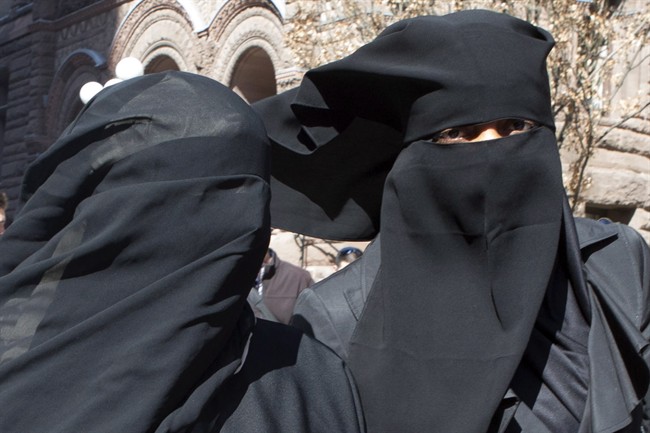OTTAWA – Canada’s ambassador for religious freedoms says he thinks it’s important that Canadians are having a debate about the place of the niqab in society.

Andrew Bennett says his office doesn’t get involved in domestic political issues; its mandate is to advocate for religious freedoms abroad.
But Bennett says he’s aware how fraught the issue of the niqab can be and that it’s important for Canadians to have a say.
The Conservative government’s decision to appeal a Federal Court ruling allowing a woman to have her face covered by a niqab while reciting the oath of citizenship has sparked a heated debate about religious rights in Canada.
The government argues Canadian values are at stake while the opposition says to ban the niqab goes against those very same values.
Bennett says he thinks the fact that Parliament is having what he calls a robust debate on the subject is wonderful and proof Canadian institutions are functioning.
Bennett spoke to The Canadian Press on Wednesday on the sidelines of a conference on religious freedoms in Ottawa. That same day, federal Conservatives were scrambling to clarify that their aversion to Muslim women wearing the niqab applies strictly to citizenship ceremonies.
But they struggled to explain why wearing the face-covering veil is no big deal in other spheres of life, including the federal public service, if – as Prime Minister Stephen Harper maintains – it’s contrary to Canadian values and “rooted in a culture that is anti-women.”
- ‘Alarming trend’ of more international students claiming asylum: minister
- TD Bank moves to seize home of Russian-Canadian jailed for smuggling tech to Kremlin
- U.S. Election 2024: Questions arise over groups door-knocking for Donald Trump
- NBC, CBS polls show Harris gaining ground as election focus shifts to Trump
“That is what the prime minister said and that is a point of view that one can hold,” said Treasury Board President Tony Clement, who is responsible for federal civil service.

Get daily National news
“That doesn’t mean that you can impose that view in the workplace or in the private sphere. The one place where I think we have a right and an obligation to stress Canadian values is in the act of obtaining one’s citizenship.”
Bennett, who was appointed Canada’s ambassador for religious freedoms in 2013, said balancing equality rights against religious freedoms is always a challenge.
“Freedom of religion necessarily intersects with equality between men and women and freedom of expression, freedom of association,” he said.
“So we have to ensure that one right does not trump another right, and I think we always have to be aware – as the prime minister has articulated – about the rights of women in society and we have to be careful to defend those rights.”
Transport Minister Lisa Raitt, who described herself as a “strong feminist,” candidly admitted she’s given no thought to the issue of wearing niqabs in venues other than citizenship ceremonies.
Others, including International Development Minister Christian Paradis, cast the issue strictly as a matter of requiring would-be citizens to identify themselves when taking the oath.
“We need to know who they are,” said Tory MP Costa Menegakis, parliamentary secretary to the citizenship and immigration minister.
“Apart from that … they should be able to wear (niqabs) absolutely, absolutely everywhere.”
The scramble to clarify came amid a social media backlash to Harper’s comments and escalating opposition charges that the Conservatives are deliberately stoking prejudice against Muslim Canadians in their bid to ramp up fear about radical Islamist terrorism.
Clement argued that Liberal Leader Justin Trudeau, who gave a major speech Monday denouncing what he dubbed Harper’s “politics of fear,” is the one expanding the issue beyond just niqabs at citizenship ceremonies.
But Conservative party talking points issued Wednesday suggest the issue is tied to the party’s broader goal of making terrorism an key issue in the coming election. After offering several lines about Trudeau being out of step with public support for banning the niqab during citizenship ceremonies, the final point says: “Unlike Justin Trudeau, we are not afraid to call the growing threat of jihadi terrorism exactly that – jihadi terrorism.”
In the House of Commons, Trudeau demanded that Harper explain “to Canada’s half a million Muslim women why he said their chosen faith is anti-women.”
“Of course, I said no such thing,” Harper countered.
He went on to read comments from two Muslim organizations supporting his contention that it’s offensive to cover one’s face while taking the citizenship oath.







Comments